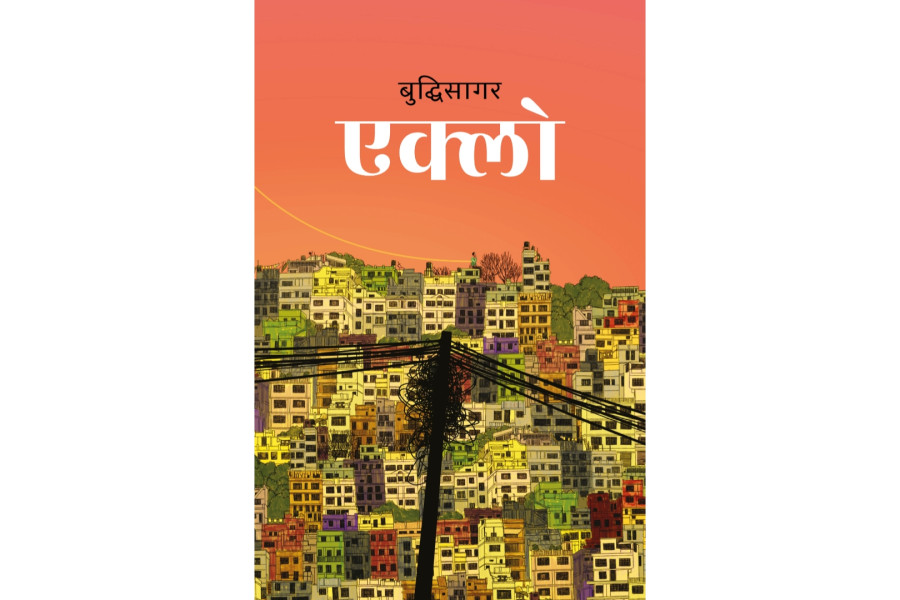Books
‘Eklo’ makes you feel not so lonely, after all
Buddhisagar’s third novel follows the life of Siri, a migrant trying to find his footing in the Valley.
Deepali Shrestha
Siri, a 21-year-old boy, lives in a small room. To everyone else, his one-roomed apartment in Ghattekulo is insignificant. But to Siri, it’s been his entire world since he came to the city to study Intermediate of Arts (now equivalent to grades 11 and 12) in the Valley. He sets foot on the crowded streets of the Capital for the first time with two bags: one full of his belongings and another full of dreams.
As the story progresses, his bag of dreams is gradually replaced by melancholy. He doesn’t complete IA because of weak English language skills and lies to his gharbeti baa (the landlord) and his family back in the village about his subsequent ‘failure.’ He tells them he is an IA graduate trying to find his footing in Kathmandu. As the story develops, Siri’s life dramatically changes when he encounters his college friend, Tope.
This is the premise of Buddhisagar’s new novel ‘Eklo’. After the success of ‘Karnali Blues’ (2010) and ‘Firfire’ (2016), Buddhisagar is back with his third novel. Those familiar with his penmanship, it is easy to notice how his stories usually have similar themes—that of rural life, migration and familial relationships. This time, however, Buddhisagar brings something new to the table. Unlike his previous works, which are set in a rural landscape, ‘Eklo’ is set entirely in Kathmandu.
The story begins in the late 90s amidst the backdrop of Maoist insurgency. This is alluded to through some lines from the book, which go: “Gods, police, army and protests weren’t the only protectors of Kathmandu; the hills were up all night. [But] Siri felt unsafe when hundreds of thousands found safety in Kathmandu.”
Similarly, Siri’s 10-bandwidth radio occasionally receives telephone signals, and he enters the lives of Samira and Nil, becoming a voyeuristic observer of modern city life through their conversations on the phone. He becomes obsessed with Samira’s voice and spends hours fantasising stories about her.
At the heart of the book—and in the backdrop of Siri’s personal experiences— lies the vivid descriptions of the Valley itself. Siri’s love for buff momo (something that’s become a symbol for the Valley’s food culture) reminds one of the indispensable presence of momo in the lives of people in Kathmandu. Anybody who has been to the city can recognise the smell of momo that escapes from the small, jam-packed eateries. Siri observes the air in Kathmandu, which for him carries the aroma of momo mingled with exhaust from vehicles, the smell of sweat reminiscent of spoiled curd, the pungency of waste heaps and contaminated river waters as well as the sporadic gusts of fresh air drifting in from the calmer far away.
Language is another recurring theme as ‘Eklo’ is also a story about a young boy’s quest to discover the words to express himself. Siri’s struggle struck a chord with me. As somebody who isn’t proud of her Nepali language skills, the guilt of growing up with an aloofness towards exploring Nepali literature has always been a sticky web I can’t escape from, no matter how hard I try. Language is what strips Siri of IA certificate, but it also makes him closer to Samira.
Moreover, the book—honest to its title—shows how loneliness is indifferent towards age, wealth, poverty, caste, gender, and so on. Through gharbeti baa and gharbeti aama (the landlady), we witness the lonely lives of the elderly in Kathmandu who await their children’s phone calls from faraway lands.
As the ending nears, it is evident that through his book, Buddhisagar has tried to combat and resist the idea of loneliness. The book successfully makes readers realise that they, too, have a story by allowing them to reflect on their—perhaps lonely—lives in the city. This book could also be the author’s reflection on his struggle in the Capital—something that most migrants to the city can relate with.
‘Eklo’ made me realise how I was missing out on a journey of remarkable literary works in Nepali that resonate in a way that a book from an international author cannot. What makes it a great book is that its characters represent real people with flaws and desires. Everybody is trying their best to escape from the vicious currents of the city. More often than not, they are miserably failing at it while also growing as a person.
Eklo
Author: Buddhisagar
Year: 2022
Publisher: FinePrint




 14.12°C Kathmandu
14.12°C Kathmandu.jpg)










